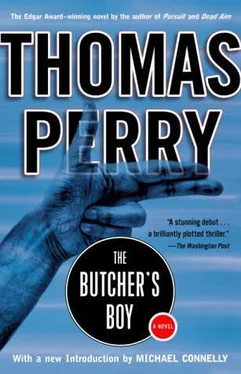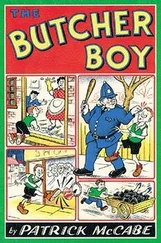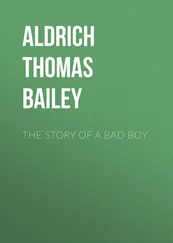She was aware of a voice beside her. She turned to see that it was one of the men at the next table, leaning his pink face toward her and smiling, the angle of his head making his tight collar cut into his shaven jowl. He said, “Would you like to join us for dessert?”
Elizabeth kept chewing and shook her head.
The man’s smile only widened, his tiny white teeth like a string of pearls. “Oh, come on. I’ll buy.”
Elizabeth swallowed, then said, “Shut up and go away. I’m thinking.”
HE KNELT OVER FIELDSTON’S body and placed the towels underneath the head. It wasn’t bleeding much, considering. In a little while it would stop, when the body cooled. Meanwhile, there was plenty to do.
The briefcase was exactly as Fieldston had said. He’d never seen so much money, he thought. Hardly anybody had. What had he said? Four million. Must be all thousand dollar bills. So maybe he hadn’t been running. He could hardly have expected to spend those bills without being noticed, and without Balacontano’s organization to launder them. So what the hell was he doing? All right, take him at his word. He was planning to pay Balacontano and then disappear, with Orloff’s checkbook as the threat that would convince Bala to leave him alone. Which meant the bookkeeping at FGE was perfect unless there was a key. But that was practically impossible. How could it be that good? The fool. Balacontano would have helped him disappear all right.
He made a quick search of the house. Fieldston apparently hadn’t touched anything in the other rooms. He must have known Orloff well. Certainly Fieldston wasn’t smart enough to have found the room without knowing, not if he’d been stupid enough to think he could blackmail Carl Bala.
He went back to the body and searched the pockets. There were no keys. He thought about it. Fieldston must have taken a cab from somewhere or walked. Probably the airport. And he hadn’t planned to go home, ever again, because he no longer even had a key to his own house. And he hadn’t checked into a hotel, he had no hotel key. Fieldston had been frightened enough to make sure nobody at all knew he was in Las Vegas.
There was a lot of work to do, so he had to move quickly. No mistakes, nothing he’d forgotten about that he had to come back later to correct. It all had to happen between now and dawn. He looked at his watch. Three thirty. Two good, safe hours and then another one before the people who worked the day shift started to get up. He went outside and drove his car into Orloff’s driveway with the lights off.
He went back into the house and looked around for something to help. Orloff’s desk chair was about right and it had wheels. He got down on his knees, put his hands under Fieldston’s shoulders, and hoisted him into the chair. Then he went to the bathroom and took two more large bath towels from the linen cupboard. Whatever else they’d done, he was sure they wouldn’t have counted towels. He wrapped one of the towels around the upper part of the body and threw the other in Fieldston’s lap. Then he pulled the office chair through the house to the door. He took the right arm and the body slumped forward onto his shoulders. He staggered with it to the car and shrugged it into the trunk. He arranged the towels as well as he could to keep the blood from escaping.
Then he returned to the house. He moved the desk chair back to Orloff’s office, shuffling his feet on the carpet to remove the imprint of the wheels. He took a final look to see that everything appeared undisturbed, then put the wallet in the briefcase and went out. At the car he remembered. How had Fieldston gotten in? Fieldston hadn’t had a key. He returned to the house and looked at each of the windows. It was the window to the guest bedroom, but Fieldston had been careful. There were no scuff marks on the sill, and the lock wasn’t damaged, just scratched minutely. He took a last look around before he left the house. He pressed down on the trunk of his car just enough so the latch caught and drove off down the street. He took a labyrinthine route to reach the freeway without going down the Strip. As he felt the car accelerate onto the freeway, he had an impulse to laugh. By the time the sun came up he’d be in Kingman, Arizona, and maybe Flagstaff by the time the stores opened up. No telling how far a man might go after he’d been shot in the head.
THE BOOKS HE SELECTED were paperbacks. In the supermarket he bought three, all of which said bestseller on their covers. In the bookstore he picked classics—books he remembered being forced to read in school. In the drugstore he found two that claimed to be something called novelizations of movies. When he had enough, he sat in the parking lot to do the packing: one bill per page. It struck him as funny that the first of the paperbacks was worth over two hundred thousand dollars. It took more than an hour, but he couldn’t afford to rush it. He was good at making packages, at tying and taping and arranging, and this was one package he wanted to make perfect.
By the time the post office opened he was there to watch the man unlock the doors. He sent the package fourth class, special book rate. It was a strange sensation to see the postman at the counter toss the package into the bin with a dozen others, all practically indistinguishable from one another. At that moment he knew there was no reason to think about it anymore. It was gone from his possession forever, and there was no way he could ever get it back. It was more money than he ever hoped to have, more than some towns were worth, probably. And now it was gone. He didn’t linger at the counter to think about it. It had all been decided hours ago, while he drove through the cold air of the dark desert. It was the only way.
The sun was rising in the sky and he had to make every hour into miles. If he waited too long the bags of ice he’d bought would start to melt, and the seals on at least some of the bags would be defective. He couldn’t afford to have water dripping from the trunk as he drove. If he kept at it he might make five hundred miles before he needed to change the ice, because the air rushing by would cool the surface of the car just as it cooled the engine. It was going to be a long time before he slept again, he thought. But there’d be plenty of time to sleep later on—twenty hours a day for the rest of his life, if he felt like it. All he had to do now was deliver Edgar. He said aloud, “Keep cool, Edgar. It won’t be long now.”
It was shortly after noon when he began to hear the sloshing sounds. Whenever he slowed down or accelerated there was a faint noise of water moving about in the trunk. By one o’clock he began to see drips of water hitting the pavement in his rearview mirror whenever the car gained speed too abruptly. When he stopped in Flagstaff to fill the gas tank he put his hand on the trunk and knew that his theory of air cooling had been wrong. The surface of the trunk was as hot as the metal fixtures on the gas pump. As he drove off he said, “Edgar, we’ve got problems. You’re getting parboiled in there. Afraid we’ve got to make another arrangement.”
It was in the Sears store that he bought the hacksaw and the shovel and the ice chest. He had to search another fifteen minutes before he found the ranchers’ supply store. When he found it he shopped carefully for the lime, reading the labels on the big fifty-pound bags: calcium oxide—95 percent; magnesia—2 percent; total silica, alumina, iron—2 percent. Water content no more than 1 percent guaranteed.
He moved the bags to the car in a cart, and was back on the road again. The bags of Blue Ice he bought at a liquor store in Winslow, because it was the first place he passed through that looked as though they might sell it already frozen.
It was mid-afternoon now and so hot that the endless, straight highway danced and quivered. Off in the distance dust devils swirled crazily and dissolved, the only signs of movement. He took Route 77 through Snowflake and Show Low, and then swung east again through Springerville and into New Mexico on Route 60. It was already night before he found the place he was looking for between Quemado and Magdalena, about fifty miles past the Continental Divide. It was a back road not shown on the map, but he could see it went somewhere. It had been over an hour since he’d seen another car, and the local ranchers would be shutting themselves in for the night. He turned off on a dirt road that wound through rocky hillocks and barrows, and kept going until he found a spot that suited him. He parked the car on the side of the road and got out.
Читать дальше












